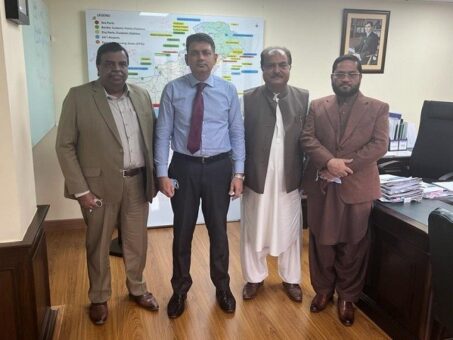Dr. Muhammad Ashfaq Ahmed, Chairman of the Federal Board of Revenue (FBR), assured a delegation of customs agents of resolving pertinent issues related to imports and exports.
(more…)Category: Trade & Industry
This section covers news on trade and industry. Pakistan Revenue is committed to providing the latest updates on business trends.
-
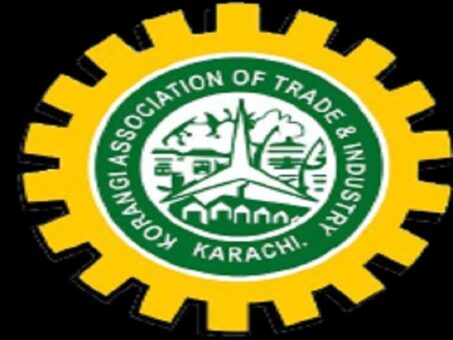
KATI expresses concerns over rising inflation
KARACHI: Salman Aslam, President, Korangi Association of Trade and Industry (KATI) has expressed serious concern over rising inflation and increasing prices of food items in the country.
“It is a matter of concern for the government to be considered as the most expensive country in the region,” KATI President said in a statement on Tuesday while quoting a survey report.
READ MORE: KATI strongly criticizes hike in petroleum prices
He said that medicines, ghee, cooking oil, tomatoes and other essential items have become more expensive.
President KATI said that the government needs to take serious positive steps to stem the tide of inflation so that the living standards of the poor and middle class of the country can be improved.
Salman Aslam said that due to the daily increase in the prices of petroleum products, gas and electricity the cost of production has increased to a dangerous level, after which it is becoming very difficult for the industrialists to run the industry.
READ MORE: Korangi Association flays key policy rate hike
He said that due to exorbitant increase in production cost, local industrialists have no other choice but to shift their capital abroad.
President KATI said that rising inflation has made life miserable for the common man which could not only deteriorate the law and order situation but also increase the pressure on the economy.
READ MORE: Around 65,000 industry workers vaccinated: KATI
He said that the industrialists were already convincing the government that timely action was essential otherwise economic stability would not be possible.
President KATI said that due to the recent increase in petroleum products, there has also been an increase in means of transportation and logistics of goods.
Salman Aslam appealed to the government to take concrete steps to control inflation and reduce production costs, so as to restore the confidence of local investors and industrialists, including foreign investors.
-
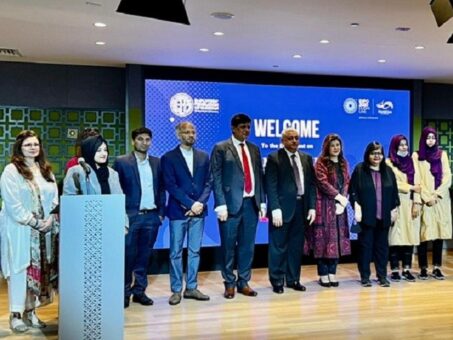
EFP organizes women empowerment seminar in Dubai
The representative body of Employer’s in the region, the Employer’s Federation of Pakistan (EFP) has organized its Women Empowerment Seminar in the Dubai Expo 2020- Pakistan Pavilion.
The purpose of the imperial event, is to showcase the success stories of different Female Entrepreneurs in the region of Pakistan that have inspired and empowered many to stay committed to their core goals.
EFP in its advocacy for women entrepreneurship and inclusion has been actively working for gender-based equality in the industry and supporting female led SMEs.
READ MORE: EOBI to launch self assessment scheme for employers
Zaki Ahmed Khan, Vice President EFP, in his welcome remarks said that “EFP has been working on different fronts to promote women empowerment in Pakistan. A significant achievement has been the active participation of females in the agricultural sector of Pakistan, particularly in interior Sindh and Punjab region of the area. Today, we share the success stories of different women entrepreneurs who have inspired many”.
The event featured Guest Speakers sessions by Ms. Jehan Ara, Founder and CEO of Katalyst Labs, and Ms. Naila Naqvi, Founder and CEO of Pie in The Sky. The Session covered personal journey of Ms. Naqvi who currently runs one of the largest business chains in Pakistan, while Ms. Jehan Ara shared stories of female entrepreneurs who are changing the startup landscape of Pakistan.
READ MORE: Employers criticize increase in key policy rate
To recognize and appreciate the contribution made by employers to support inclusion of women in the workforce, EFP also featured corporate success stories of K-Electric and Mobilink Microfinance Bank to promote spirit of responsible practices by corporations.
K-Electric’s Roshni Baji safety ambassadors – Abeera Almas and Zara Afshan were also invited to share their remarkable journey towards leading a massive behavioral shift in the society. The ambassador program is winner of various national and international accolades including the 23rd S&P Global Platts Energy Awards.
READ MORE: Employers flay new tax ordinance
Speaking at the occasion, Ghazanfar Azam, President & CEO MMBL said, “We strongly believe women’s participation in the formal economy is crucial for Pakistan’s economic progress. That is why we strive to engender an enabling environment where women have both the opportunity and the financial means to grow and prosper. Our customized financial products and services ecosystem and special initiatives such as Women Inspiration Network (WIN) continue to make a difference for women both in and outside our organization”.
Ismail Suttar, President EFP, greatly admired the contribution made by the guest speakers. He further commented that EFP has a crucial role to play to make Pakistan a more progressive economy with high women participation across all sector and industry.
Suttar said, “We cannot move forward if half our population is not active, therefore, the efforts made by EFP are very important and soon we will see how Pakistan will have higher women ratio in workforce because we can’t afford to have only the men to work and earn a living”.
-
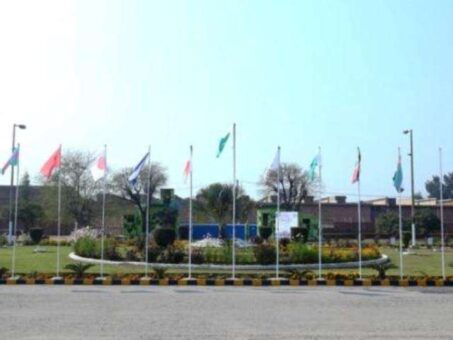
Citi Pharma declares 100% increase in half year profit
KARACHI: Citi Pharma Limited on Tuesday announced about 100 per cent increase in its net profit for the half year ended December 31, 2021.
The net profit of the company was Rs343 million for the half year ended December 31, 2021 as compared with Rs168 million in the same period of the last year.
READ MORE: PSX notifies listing of Citi Pharma
The company said that the net profit had witnessed significant rise in spite of the expenses incurred on the listing of the company during the period under review.
In the period under review, the net sales increased to Rs4.84 billion for the half year ended December 31, 2021 as compared with Rs2.63 billion in the corresponding period of the last year, showing a growth of 84 per cent.
Similarly, the gross profit increased to Rs701 million for the period under review as compared with Rs410 million in the same period of the last year.
READ MORE: Citi Pharma’s IPO oversubscribed; Rs2.32 billion raised in book building
On the quarter basis there is an increase of sales of the company from Rs1.99 billion to Rs2.85 billion and registered an increase of 43 per cent from the previous quarter.
The gross profit for the quarter increased to Rs405 million as compared with Rs296 million from the previous quarter and witnessed an increase of 37 per cent.
READ MORE: Citi Pharma’s IPO book building starts June 15
Net profit of the second quarter has improved to Rs261 million a compared with Rs81 million and registered an increase of 222 per cent on quarter basis, in the first quarter listing expense of Rs129 million was incorporated otherwise the profit could have been Rs210 million.
The company has also decided to increase the number of beds of the hospital from 50 to 200.
READ MORE: List of cities contributing tax above Rs1 billion
-

Numbeo’s Pakistan Index stuns Karachi Chamber
Karachi Chamber of Commerce and Industry (KCCI) is stunned over the Numbeo’s cost of living index in which it has been claimed that Pakistan was the cheapest country amongst 139 countries of the world.
KCCI President Muhammad Idrees while referring to Finance Minister’s tweet about latest Numbeo’s cost of living index in which it has been claimed that Pakistan was the cheapest country amongst 139 countries of the world, stated that this ranking cannot be taken into consideration as it was mainly based on low rent and groceries index whereas the other major components like low per capita income, rate of inflation, poverty and unemployment etc. have not been taken into consideration in finalizing the ranking, hence the claim about Pakistan being the cheapest country was unfounded and contrary to ground realities.
READ MORE: PM appealed restoring gas to Karachi industrial zones
“The entire population of Pakistan suffers badly due to across-the-board inflation which has mainly been triggered by high cost of utilities and the constant rise petroleum prices affecting prices of all the household commodities, adding more miseries to the lives of the poor masses,” he said.
He pointed out that the World Bank estimated that the poverty ratio in Pakistan stood at 39.3 percent in 2020-21 using the lower-middle-income poverty rate of $3.2 per day income while 40 percent of households suffered from moderate to severe food insecurity.
He noted that Consumer Price Index (CPI) inflation in the country has consistently been on a steep rise as during seven months of FY22, inflation was recorded at a whopping 10.26 percent as compared to 8.19 percent during the same period of FY21.
READ MORE: KCCI holds awareness seminar on Pakistan Single Window
He further mentioned that the government recently raised up to Rs12.03 per liter in the prices of petroleum products, taking petrol to a record level of Rs159.86 per liter effective from February 16 and it was really worrisome that they plan to increase petroleum prices further by Rs6 per liter which was going to create a really troublesome situation not only for the masses and the businesses but also the already ailing economy.
“Moreover, a significant increase in the prices of power tariffs is also on the card. Power tariff is likely to increase by Rs6.10 per unit on account of fuel cost adjustment (FCA) for the month of January this year. According to NEPRA, the cost of fuel for electricity generation in Jan’22 increased by 101.5 percent to Rs12.22 per unit on a year-on-year basis. The rising prices of utilities will have a ripple effect on all products and will further heat up inflation”, he warned, adding that it would further erode the purchasing power of the masses.
Muhammad Idrees was of the opinion that the major impact on inflation comes from imports which are susceptible to Pak Rupee devaluation. The Pakistani rupee lost over 10 percent or around Rs16.68 of its total value during 2021 with the currency really taking the brunt during the second half of the year. On 31st December 2021, the currency was traded at Rs176.51 compared to Rs159.97 in the beginning of the year. It even hit a low of Rs181.80 on 16th December 2021. Therefore, the exchange rate should be kept stable to minimize the impact of rising inflation, he stressed.
READ MORE: KCCI urges SBP to restore PKR at Rs150 to dollar
President KCCI further stated that during first seven months of FY22, exports were recorded at $17.67 billion, while imports were recorded at $46.47 billion, resulting in a trade deficit of $28.8 billion. “Pakistan’s major dependence on imported goods and its inability to diversify export commodities and markets remain major challenges for the country’s economy eating away valuable reserves,” he added.
President KCCI underscored that instead of further overburdening the masses, the government has to come up with an effective strategy to minimize the impact of inflation by subsidizing the rising POL prices, promote import substitution to shrink trade deficit, bring down the cost of doing business by reducing prices of utilities, taxes and duties so that the poor masses could survive and the businesses could also stay afloat.
READ MORE: KCCI flays restoration of IR officers bank freezing powers
He hoped that the present government must take the ground realities into consideration and take steps to minimize the hardships being suffered by the already overburdened masses and the businesses who simply cannot afford any further shocks in terms of rising cost of doing business.
-

PPMA raises tax refund issue with finance minister
ISLAMABAD: Pakistan Pharmaceutical Manufacturers Association (PPMA) on Thursday raised the issue of sales tax refunds at a meeting with Finance Minister Shaukat Tarin.
A delegation of PPMA headed by its chairman Qazi M. Mansoor Dilawar met the finance minister at Finance Division.
READ MORE: POS retailers to get refunds automatically: Tariq Mustafa
Chairman PPMA shared about the problems being faced by the Pharmaceutical manufacturers particularly the concerns pertaining to refund of sales tax.
These unresolved matters result in unnecessary delays and thus impact overall working efficiency of PPMA.
READ MORE: Provision to pay sales tax refunds through bonds
Furthermore, they requested for the resolution of the mentioned issues. Federal Minister on Finance and Revenue Shaukat Tarin commended the contribution of pharmaceutical manufacturers.
It was accredited that this sector has substantial role in the economic development of the country.
READ MORE: SBP urged to direct banks for accepting sales tax refund bonds
He assured that all such reservations of PPMA will be resolved at earliest time possible.
The Finance Minister further directed FBR to carry out all possible measures for settlement of the issues of pharmaceutical industry.
The PPMA delegation thanked the Finance Minister for ensuring the full support for resolution of their issues.
-

Textile exports surge to record high $11 billion in 7MFY22
KARACHI: The exports of textile products have witnessed sharp increase of 25 per cent to $11 billion during first seven months (July – January) 2021/2022 7MFY22, according to data of the Pakistan Bureau of Statistics (PBS) released on Wednesday.
The exports of textile products were $8.76 billion in the same months of the last fiscal year.
READ MORE: SBP expands export finance scheme to improve inflows
In Pak Rupee (PKR) terms, the same has clocked in at Rs1,861 billion, up 30 per cent YoY due to 4 per cent currency devaluation, analysts at Topline Securities said.
During 7MFY22, key export driver was increase in value-added exports where knitwear segment contributed the most as it increased by 33 per cent YoY to $2.9 billion followed by Ready-made garments (+22 per cent YoY to $2.2 billion) and Bedwear (+19 per cent YoY to $1.9 billion) exports, respectively.
On MoM basis, Pakistan textile exports is down 4 per cent to $1.5 billion in Jan-2022, led by lower value-added exports segments mainly in Knitwear (down 12 per cent MoM) and Ready-made garments (down 4 per cent MoM) respectively.
READ MORE: PHMA cries foul on gas suspension to textile industry
Compared to last year, Pakistan textile exports are up by 17 per cent YoY (29 per cent YoY up in PKR terms) in Jan-22 led by significant recovery witnessed in value-added segments, largely in knitwear (up 19 per cent YoY), Ready-made (up 17 per cent YoY) and Bedwear (up 21 per cent YoY).
Increased volumetric growth and improved pricing were the key drivers resulting in higher exports.
Going forward, the analysts expect textile exports to keep robust in ongoing FY22 fiscal year to clock in at $18.5-19 billion.
Ease of lockdown in European economies is likely to drive increased orders and help overall textile exports, the analysts added.
The Federal Cabinet on February 15, 2022 has finally approved the Textile and Apparel Policy 2020-25, after Ministry of Commerce (MoC) submitted the revised draft of textile policy to Economic Coordination Committee (ECC) incorporating few amendments.
READ MORE: Textile exporters urge allowing cotton import from India
The key reason behind the late approval was the dispute between MoC and Energy Ministry on the issue of Energy Tariffs (RLNG and Electricity).
As per reports, the updated draft stated that Energy Tariffs (RLNG and Electricity) will be provided to textiles and apparel industry at regionally competitive rates during the policy years. For this, tariff will be reviewed and announced in federal budget by Finance Division.
As per Pakistan Institute of Development Economics (PIDE), the average regional electricity tariff rate stood at 7.4 cents/kWh in Mar-21, which we believe has likely increased since than. Pakistan’s current electricity tariff is around 9 cents/Kwh.
READ MORE: Gas shortage created purposely for using RLNG: KCCI
In case of RLNG, the average regional RLNG rate stood at $4/MMBTU as per PIDE as compared with Pakistan’s tariff rate at $6.5/MMBTU. The analysts believe the above stated textile policy will have a neutral impact on the sector. Given, Pakistan is already offering subsidized energy & RLNG tariffs to textile players and Pakistan being part of an IMF program, a further reduction from the current levels is highly unlikely.
RLNG tariff is expected to remain intact at $6.5/MMBTU level although regional average is comparatively low. To note, RLNG is currently being provided at $9/MMBTU to textile sector till March-22 due to supply issues.
-

KATI strongly criticizes hike in petroleum prices
KARACHI: Korangi Association of Trade and Industry (KATI) in a statement on Wednesday strongly criticized the government for the substantial increase in petroleum prices.
Ms. Maheen Salman, acting president of KATI said that increase in prices of petroleum products by the government more than Rs 12 per liter is unacceptable and unbearable.
READ MORE: Pakistan raises petrol price to record high at Rs160/liter
She said that the price of petrol in the history of the country has crossed the highest level of Rs150 liter and reached a PKR 160 per liter which is alarming. Earlier, the price of petrol was beyond the purchasing power of the people.
Maheen Salman said that due to the policy of the government, the inflation for the lower income group had gone up to 21 percent and now the recent increase in petroleum products will further increase the inflation which will severely affect the middle class and upper-middle-class including the poor.
READ MORE: Korangi Association flays key policy rate hike
Acting President KATI said that inflation has broken the back of the low-income group. There are no steps being taken by the government to provide some relief to the poor.
Maheen Salman further said that the statement of the Finance Minister came out in the assembly that the IMF has strict conditions to withdraw the subsidy from the people.
READ MORE: Around 65,000 industry workers vaccinated: KATI
In such a situation, the government is increasing inflation on a daily basis but the means for the increase in revenue are not being created.
Job opportunities are dwindling, industries are closing, flight of investment is all-time high, so how can the country develop. She appealed to the government to keep the inflation rate in line with the purchasing power of the people.
-
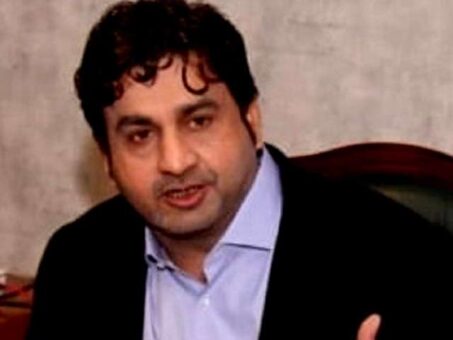
NKATI urges PM Imran to reduce petroleum prices
Faisal Moiz Khan, the President of the North Karachi Association of Trade & Industry (NKATI), has expressed deep concerns regarding the recent surge in domestic petroleum prices.
(more…) -

SSGC restores supply to CNG stations ahead schedule
KARACHI: Sui Southern Gas Company (SSGC) on Friday announced to restore gas supply to CNG Stations from February 14, 2022, a day ahead for scheduled restoration.
“The gas supply will be restored to CNG stations based on RLNG from February 14, 2022,” Salman Ahmed Siddiqui, Head of Corporate Communications, and spokesman SSGC said.
READ MORE: Industry protests against gas shortage at SSGC
As per gas management plan the gas supply was remained suspended since December 01, 2021 and was to be restored on February 15, 2022. “The gas supply will be restored ahead of scheduled time to those CNG stations, which are using RLNG,” the spokesman added.
READ MORE: PM appealed restoring gas to Karachi industrial zones
The Senior vice chairman of the All Pakistan CNG Association (APCNA), Central, Shoaib Khanjee said that the gas is being restored after two and a half months. “We hope gas stations will not be closed due to gas shortage,” he added.
READ MORE: PHMA cries foul on gas suspension to textile industry
He said that the industry had suffered immense losses due to the gas suspension. He appealed the government to provide subsidy to the industry. He also appealed the government to take stern action against those who involved in sabotage of the industry.
